Scalenut vs. Dashword: A head-to-head comparison of these popular SEO tools. We’ll explore their strengths, weaknesses, and pricing to help you make an informed decision.
Comparison Scalenut and Dashword
In today’s digital landscape, a robust SEO strategy is non-negotiable for online success. Two leading contenders vying for your attention in the crowded SEO tool market are Scalenut and Dashword. Both promise to streamline your SEO workflow and propel your website to the top of search engine rankings. But which one reigns supreme?
This comprehensive comparison dissects the features, strengths, weaknesses, and pricing of both platforms to help you make an informed decision for your specific SEO needs.
Scalenut
Scalenut positions itself as an “AI co-pilot” for your entire SEO content lifecycle. It combines keyword research, content planning, AI writing, optimization, and performance analysis within a single platform.
Scalenut: Overview
Scalenut is an AI-powered content marketing platform designed to help businesses create high-ranking content, optimize for search engines, and track performance.
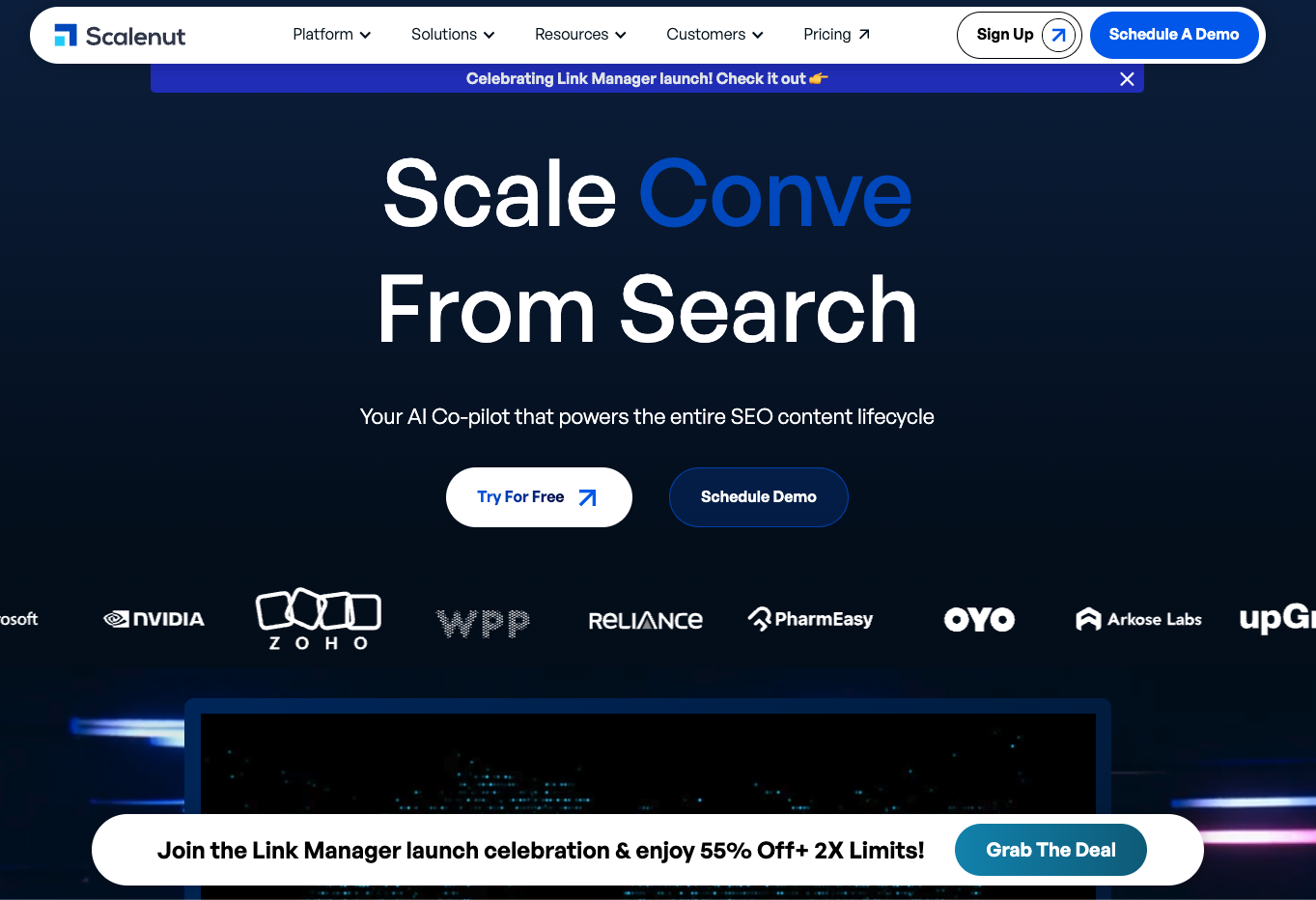
Scalenut: What It Does
- Keyword Planning: Uncovers relevant keywords, analyzes search intent, and identifies content gaps.
- Content Outlining: Generates content outlines and briefs based on SERP analysis and competitor research.
- AI Content Writing: Offers an AI writing assistant with multiple templates and a “Cruise Mode” for faster content creation.
- SEO Optimization: Provides real-time SEO scoring, NLP term suggestions, and automated content optimization features.
- Performance Tracking: Tracks website traffic, keyword rankings, and other essential SEO metrics.
Key Features of Scalenut
“Cruise Mode” for rapid AI-powered content generation
Content planning and outlining tools based on SERP data
Real-time SEO content scoring and optimization suggestions
Keyword clustering and analysis for topic authority
Integration with WordPress for direct publishing
Who is Scalenut For?
Content-heavy websites and blogs
Businesses focusing on content marketing and SEO
Marketing teams looking for data-driven content strategies
Pros of Scalenut
Strong emphasis on content quality and SEO best practices.
Advanced content planning tools with SERP data integration.
Comprehensive AI writing features with various templates and styles.
Real-time SEO optimization and suggestions for content improvement.
Cons of Scalenut
Can be expensive, especially for higher content volume needs.
The interface, while feature-rich, might feel overwhelming for beginners.
Limited automation features for tasks like content scheduling and publishing compared to competitors.
Advanced content planning and research tools
Powerful AI writing assistant with “Cruise Mode”
Real-time SEO content optimization and scoring
In-depth keyword analysis and clustering
Integration with WordPress
Higher price point
Steeper learning curve
Limited automation features
Scalenut Pricing
- Essential: $18/month (billed annually) – Best for individuals and small businesses.
- Growth: $36/month (billed annually) – Ideal for startups and growing businesses.
- Pro: $67/month (billed annually) – Suitable for larger teams and agencies.
Scalenut’s pricing is based on a credit system, with credits used for various actions like generating content or analyzing keywords. They offer three primary plans:
Scalenut also offers an Enterprise plan with custom pricing for organizations with specific needs.
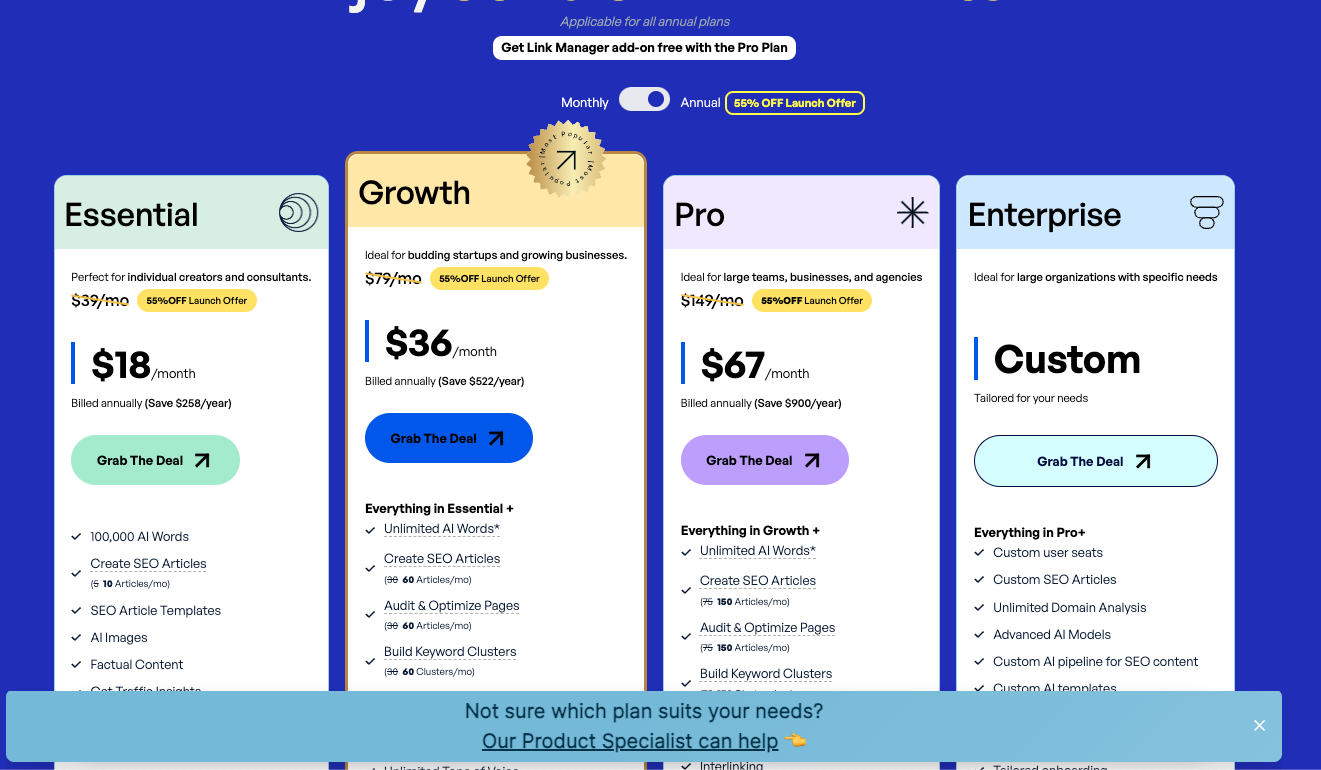
What Users Say About Scalenut
Users highlight Scalenut’s robust content creation and optimization capabilities, praising the “Cruise Mode” for its efficiency. Many appreciate the data-driven approach to content planning and the actionable insights provided for SEO improvements.
What’s Missing in Scalenut
More seamless automation features for content scheduling and multi-platform publishing.
A wider range of integrations with third-party SEO and marketing tools.
A more budget-friendly pricing option for individual users and smaller businesses.
Final Thoughts on Scalenut
Scalenut is a powerful content marketing platform that excels in AI-powered writing, SEO optimization, and content planning. It’s an ideal choice for businesses prioritizing high-quality, data-driven content to boost their organic search visibility.
Dashword
Dashword focuses on empowering content creators and marketers to produce high-quality, SEO-optimized content efficiently. With its intuitive content brief builder and real-time optimization suggestions, Dashword aims to elevate content quality while boosting organic visibility.
Dashword: Overview
Dashword is a content marketing platform specializing in content brief creation, SEO optimization, and content performance monitoring.
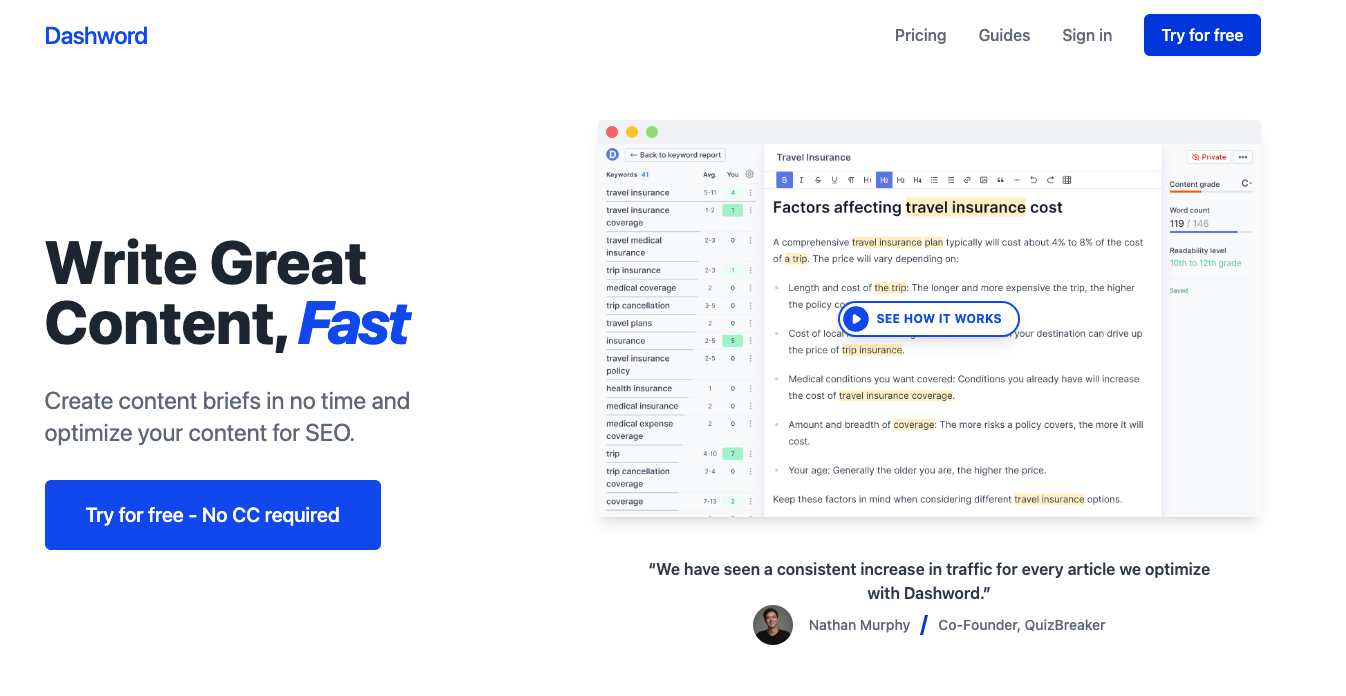
Dashword: What It Does
- Content Brief Builder: Helps create detailed briefs with keyword research, competitor analysis, and content structure suggestions.
- Content Optimization: Provides real-time feedback and scoring based on SEO best practices.
- Content Monitoring: Tracks content performance, identifies underperforming pages, and suggests updates.
Key Features of Dashword
- Competitor Content Analysis: Extracts outlines and key topics from competitor articles for inspiration and strategic content planning.
- Interactive Content Brief Builder: Facilitates collaborative brief creation with an easy-to-use interface.
- Real-Time SEO Feedback: Scores content based on keyword usage, readability, and other SEO factors.
- Automated Content Monitoring: Tracks keyword rankings, traffic trends, and alerts users to content requiring updates.
Who is Dashword For?
Content marketing teams looking to streamline their content creation process.
Businesses wanting to improve the quality and SEO performance of their content.
Agencies managing content creation for multiple clients.
Pros of Dashword
- Content Quality Focus: Emphasizes creating high-quality, well-researched content.
- Collaborative Brief Creation: Facilitates seamless teamwork on content strategy and development.
- Data-Driven Optimization: Provides clear, actionable insights to improve content performance.
- Time-Saving Automation: Automates content monitoring and reporting, freeing up time for strategic tasks.
Cons of Dashword
- Less Comprehensive SEO Features: Lacks some of the all-in-one capabilities offered by Seorocket, such as keyword research and automated publishing.
- Content Optimization Limited to On-Page Factors: Doesn’t offer tools for off-page SEO optimization like link building.
- Pricing May Be Prohibitive for Small Businesses: The Business plan, which includes content monitoring and more extensive features, might be costly for smaller companies or individual bloggers.
Streamlined content brief creation
Real-time SEO optimization feedback
Content performance monitoring and reporting
Collaborative features for teams
Not a full-fledged SEO suite
Focus primarily on on-page optimization
Pricing may be high for smaller businesses
Dashword Pricing
- Startup: $99/month
- Business: Custom pricing (starts at $349/month)
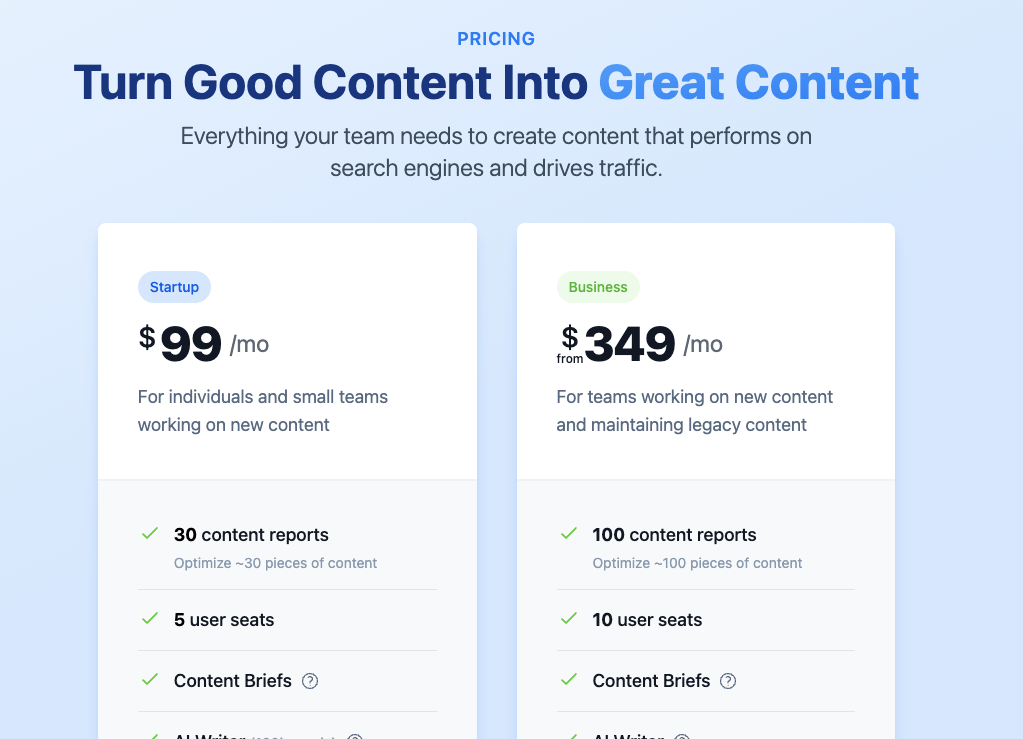
What Users Say About Dashword
Users praise Dashword for its ability to simplify content creation, improve content quality, and increase organic traffic. Many highlight the user-friendly interface and helpful content optimization suggestions.
What’s Missing in Dashword
Keyword Research Tools: Requires users to rely on external tools for comprehensive keyword research.
Content Generation Capabilities: Doesn’t offer AI-powered content writing features.
Limited Integrations: Could benefit from a wider range of integrations with popular marketing tools.
Final Thoughts on Dashword
Dashword shines as a powerful content marketing platform ideal for businesses prioritizing high-quality, SEO-optimized content. Its focus on streamlining the content creation process, providing data-driven optimization suggestions, and monitoring performance makes it a valuable asset for content-focused teams. However, companies seeking a complete SEO suite with keyword research, content generation, and a wider range of features may need to consider other platforms or supplement Dashword with additional tools.
Scalenut vs Dashword: Which One Should You Choose?
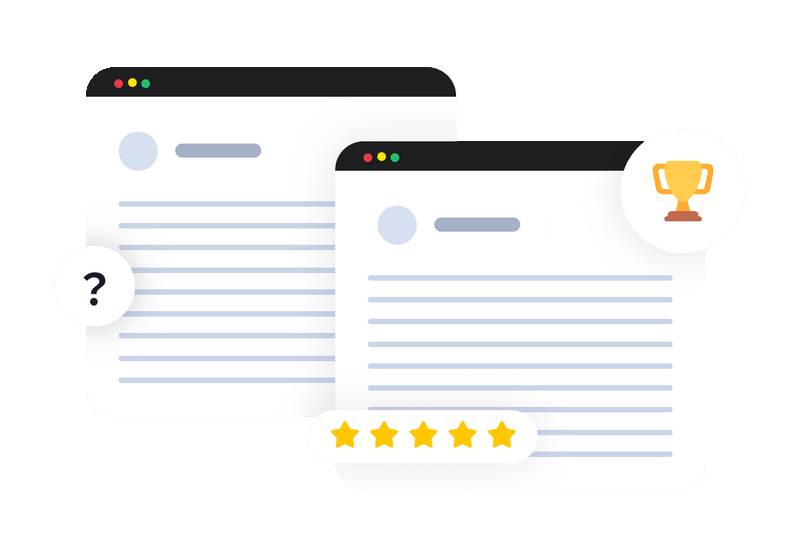
Choose Scalenut if:
– You prioritize high-quality, data-driven content creation.
– In-depth keyword research and content planning are crucial for your strategy.
– You value real-time SEO optimization suggestions and content scoring.
Choose Dashword If:
– You prioritize creating high-quality, well-researched content and want a platform dedicated to content optimization.
– You value collaborative features and need a tool that facilitates teamwork on content strategy and creation.
– You seek data-driven insights and actionable suggestions to improve your content’s SEO performance.
search engines ranking patterns to create content that dominates
searches, all without penalty risk.

Why Consider SEOrocket Over Scalenut and Dashword?
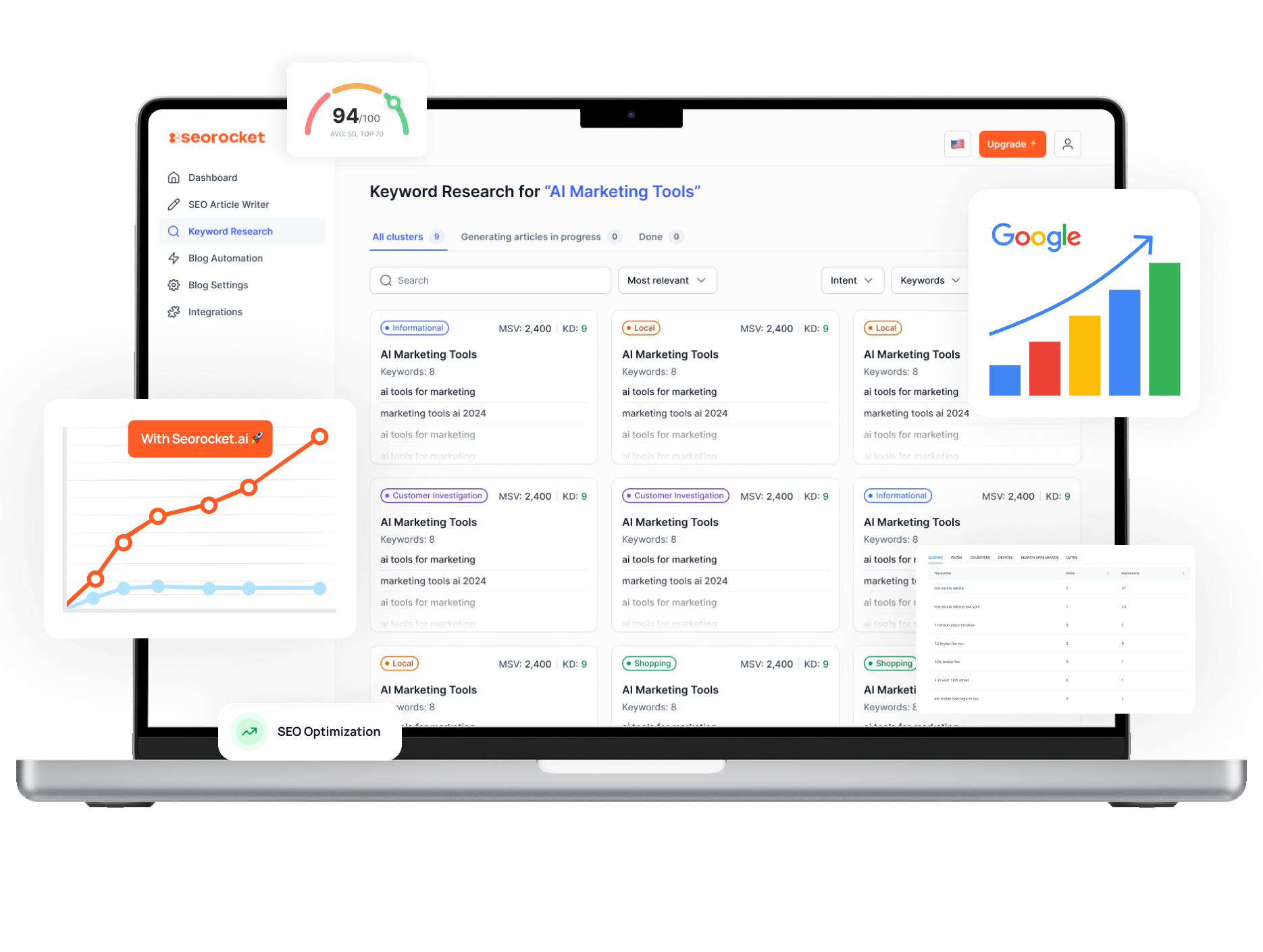
While Scalenut and Dashword AI are strong contenders in the content optimization and generation landscape, Seorocket stands out as a comprehensive and cost-effective alternative. Here’s why:
By choosing Seorocket, you can streamline your content marketing efforts, save time and resources, and achieve significant improvements in your search engine rankings.




